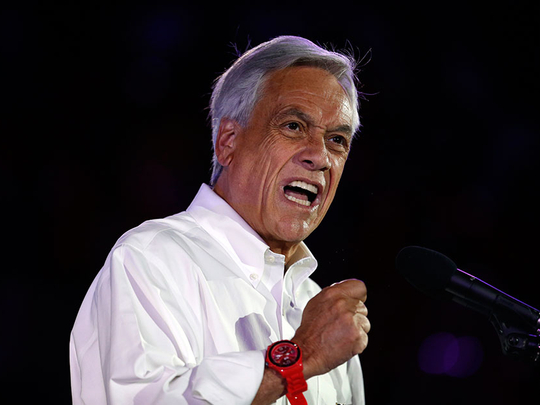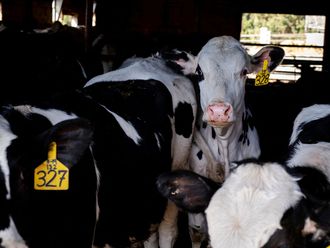
Santiago: Sebastian Pinera, one of Chile’s richest men, looks likely to prevail in the first round of the country’s presidential election on Sunday, confirming his front-runner status to succeed Socialist leader Michelle Bachelet.
If the 67-year-old billionaire does ultimately become head of state, it would be his second chance to run Latin America’s fifth-biggest economy — confirming a tag team for power that he and Bachelet, 66, have been performing for the past decade.
Chile’s constitution does not permit consecutive terms for its president. But re-election after a skipped term is permissible, and that quite possibly is what is in store after this weekend, thus swinging the pendulum of Chile’s national politics from left back to right again.
Voter intention surveys credit the Harvard-educated Pinera, who was president from 2010-2014, with a comfortable lead in the race — but not enough to win the presidency outright on Sunday.
“It’s not very likely” he will get the 50 per cent or more of ballots needed to avoid a run-off, said political analyst Mauricio Morales of Talca University.
In that case, a second-round showdown would be held between the top two candidates on December 17. The winner takes over in March next year.
Voter apathy
Apart from Pinera, Sunday’s field counts seven candidates.
His closest rival is Alejandro Guillier, a former state TV anchor turned senator who presents himself as an independent but who has the backing of Bachelet’s Socialists.
Guillier is credited with 25 per cent of voter support, against 44 per cent for Pinera.
With the outcome weighted heavily in Pinera’s favour, voter apathy could be an issue.
Compulsory voting was dropped in 2012, and since then a growing proportion of the 14-million-strong electorate has decided to stay away from polling stations.
“People don’t want to vote because, really, nobody believes there will be any significant change anywhere. Also, they see who will be president as a foregone conclusion,” said Catalina Gascone, a 19-year-old student.
Analysts predict abstention could be as high as 40 per cent on Sunday, and that Pinera has more motivated voters who will turn out.
Chileans living abroad have already begun casting their ballots, beginning with those living in New Zealand. Some 40,000 registered to take part in the election.
No majority?
Pinera’s first presidential victory in 2009 elections signified a break from the centre-left politics that had reigned in Chile since democracy was restored with the end of Augusto Pinochet’s dictatorship in 1990.
But a comeback by him was not seen as a rejection of the overall economic and social model erected in the Bachelet years, during which Chile posted 1.8 per cent in annual growth and saw tax and labour reforms, an introduction of free education, and the right to abortion.
“Chileans don’t want to tear down the model, just fix its structure,” Morales said.
Pinera has promised modifications to Bachelet’s reforms, as well as vowing to have Chile join the club of developed nations within the next eight years.
His effectiveness, though, could be hobbled by a shortfall in legislative support.
“He is not going to have a majority in Congress,” another analyst, Marta Lagos, founder of Latinobarometro and MORI Chile, predicted.
Sunday’s balloting also includes legislative elections for many of the congressional seats. Electoral forecasts suggest the right will increase its representation, but likely will not have the majority in either chamber.












